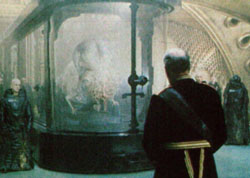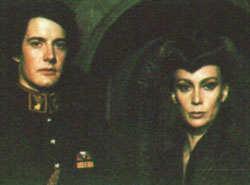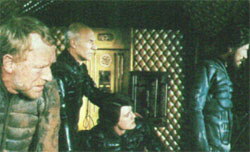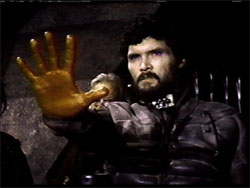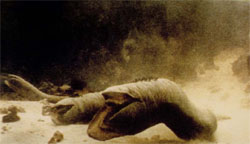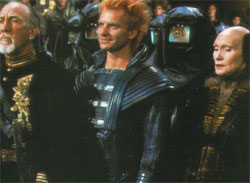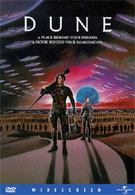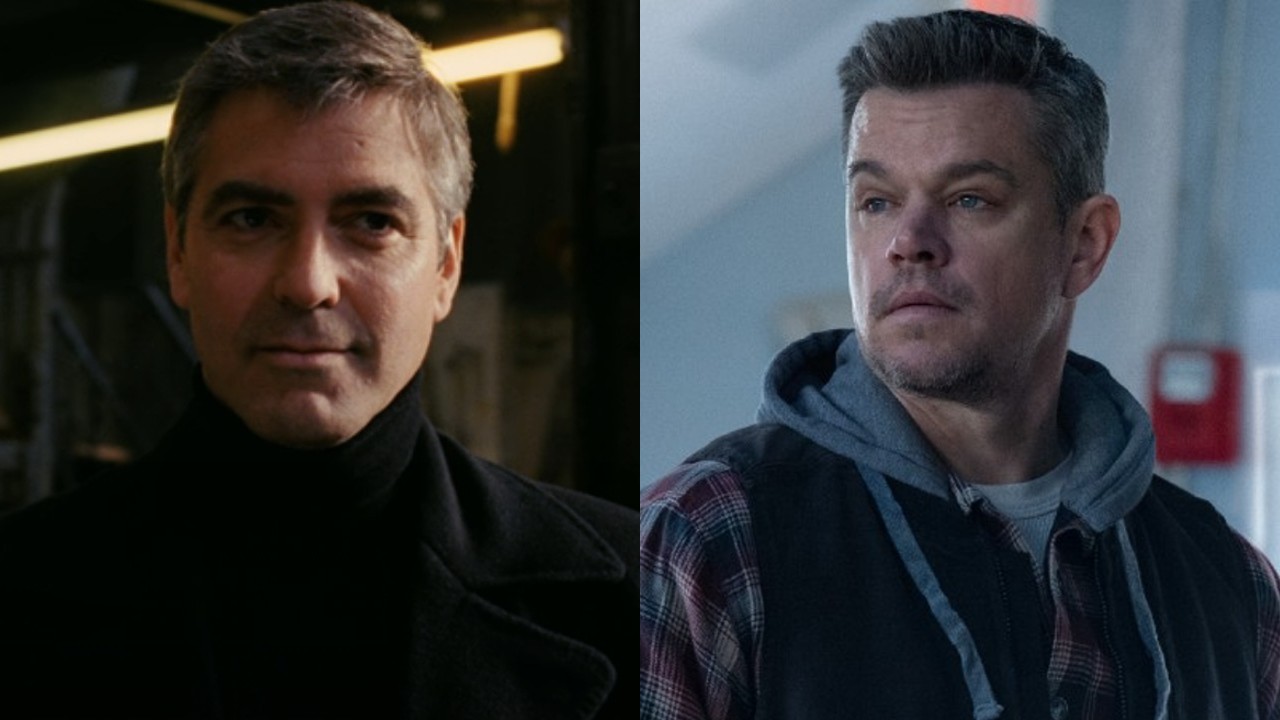Frank Herbert's classic science fiction novel "Dune" is a masterful epic, blending a variety of social, political, and economic issues into a gripping and thought provoking tale of messianic ascension. Herbert's story was more than just a bunch of rebels running around on sand dunes, chasing giant worms and fighting evil dictators. It was class struggle, corruption, inner growth. Sadly, when someone finally got around to turning his work into a movie, all of that was forgotten amidst swirling desert winds, constructed on a long ago disassembled Hollywood soundstage.
Dune stars an oddly familiar cast of future and past stars in the story of the betrayal and ascension of house Atreides. Thousands of years in the future, man has long abandoned earth for the stars. The human race is divided into galactic feudal kingdoms ruled by houses all swearing an allegiance to one unifying Emperor. Trade is ruled by a mineral called "spice" used to prolong human life, fuel space travel, and endow mankind with amazing powers. "Spice" is found only on the planet Arrakis, also called Dune. It is the center of the galaxy. The most important planet in the universe. It is on this planet that house Atreides is entrapped and destroyed by evil House Harkonnen. Only the son of Duke Leto Atreides, Paul Atreides (Kyle MacLachlan), survives their betrayal. Paul, along with his mother escapes to the desert, where he joins up with the wandering desert nomads of Dune, the Fremen, to become their messiah, and fight to restore honor and power to fallen house Atreides.
Frankly, Dune tries to cram SO much into its lengthy time span, that to anyone who hasn't already clued in on the books, the film is incomprehensible. Even the narrated introduction, intended to bring viewers up to speed on the world they are about to enter, fails to bring clarity to the muddled presentation of Frank Herbert's incredibly complex world. Instead, we are left with a bevy of practically unconnected and stilted scenes in which characters act and react, but without clearly defined personality, motive, or drive. Momentous events are glossed over in an ever-present rush to get on to the next scene as screen time runs short.
The real problem though, is that much of Herbert's original novel focuses on inner thoughts that take place unverbalized within his characters. The film tries to give us that through a series of unending and annoying internal monologues, which persist throughout the film. Scene after scene of characters sitting unmoving while we listen to them "think." In small doses this can be a useful tool, but Dune crosses a line, overwhelming viewers with unending and generally useless vocalized, internal monologue.
Dune insists on TELLING us what is happening through narration and inner monologue rather than showing us, as befits the more visual medium of film. Don't TELL me what this character is feeling, get your actors to ACT and show me emotion... don't just tell me about it! Stop prattling on about how the galaxy works in boring descriptions of worlds and politics we never see or understand! Have the wherewithal to incorporate it into the film's plot and use it in part of the story as a whole. No one should have to read a fact sheet before watching in order to make sense of the complicated politic behind the scenes of the scripted parts of the film. But for Dune, it really is a pre-requisite.
Strangely enough, Dune flies to the other extremes when developing its villain, the Baron Harkonnen. His character lacks any shred of subtlety. Director David Lynch practically beats us over the head with his evil nature, tripping over himself in a headlong rush to make the Baron look like the devil himself. As a villain he's one dimensional, and over the top evil, raping and murdering young boys for sexual pleasure and living in slovenly, bloody luxury, Baron Harkonnen is the ultimate bad villain cliché.
At least Dune's actors deliver passable performances, even under the most tedious of scripted circumstances. Patrick Stewart is especially notable as the dashing and engaging mentor to Paul Atreides, Gurney Halleck. Even Sting manages at least a notable outing as the young nephew of Baron Harkonnen.
Your Daily Blend of Entertainment News
But their efforts are really for naught in a film that can be considered little more than an insult to the good name of Frank Herbert and Dune. This Dune throws out all the intelligence, depth, and creativity of Herbert's novel in favor of annoying gimmicks, rubber hose worms, and fat, bloated villains in a farcical attempt at sand blasted epic adventure.
